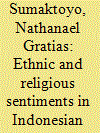| Srl | Item |
| 1 |
ID:
179562


|
|
|
|
|
| Summary/Abstract |
Studies have documented how ethnic and religious sentiments shape the voting behavior of Indonesian Muslims. However, to date no studies have carefully measured the relative influence of these sentiments. I fill this gap in the literature by taking advantage of the candidacy of a Christian, ethnic Chinese candidate in the 2017 Jakarta gubernatorial election in Basuki Tjahaja Purnama (Ahok). Employing an original survey of Jakartan Muslims, I show through experimental and correlational analyses that Muslim voters are more opposed to Ahok than non-Muslim voters are and that this opposition is driven more by Ahok's ethnicity, as opposed to his religion. I also show that Muslim voters’ feelings toward ethnic Chinese shape their support for Ahok more than their feelings toward Christians. I discuss how these findings inform our understanding of the limits and extent of religious influence on Muslim voting behavior.
|
|
|
|
|
|
|
|
|
|
|
|
|
|
|
|
| 2 |
ID:
190884


|
|
|
|
|
| Summary/Abstract |
This article investigates how and when regime transitions intensify minority discrimination through an analysis of two types of religious persecution following the Arab uprisings. We argue that weakened institutions and the prevalence of religious outbidding during political transitions make societal-based religious discrimination (SRD) more likely to increase than government-based religious discrimination (GRD). This is because social divisions are often exacerbated and social unrest difficult to contain, while at the same time, policy change can be difficult to enact and enforce. We test these claims through a mixed-methods research design. Employing a synthetic control method, the cross-national, quantitative analysis from 1990 to 2014 confirms that GRD has not changed since the Arab uprisings, while SRD has substantially increased in those countries (i.e. Egypt, Libya, and Tunisia) that also experienced regime change. A case study of Egypt provides more direct evidence of the institutional and outbidding mechanisms. The qualitative analysis draws on ethnographic research conducted in Cairo during 2014, which includes in-depth interviews with Coptic Orthodox Christians. Our findings underscore the twin challenge of protecting and accommodating minority religions during periods of political transition.
|
|
|
|
|
|
|
|
|
|
|
|
|
|
|
|